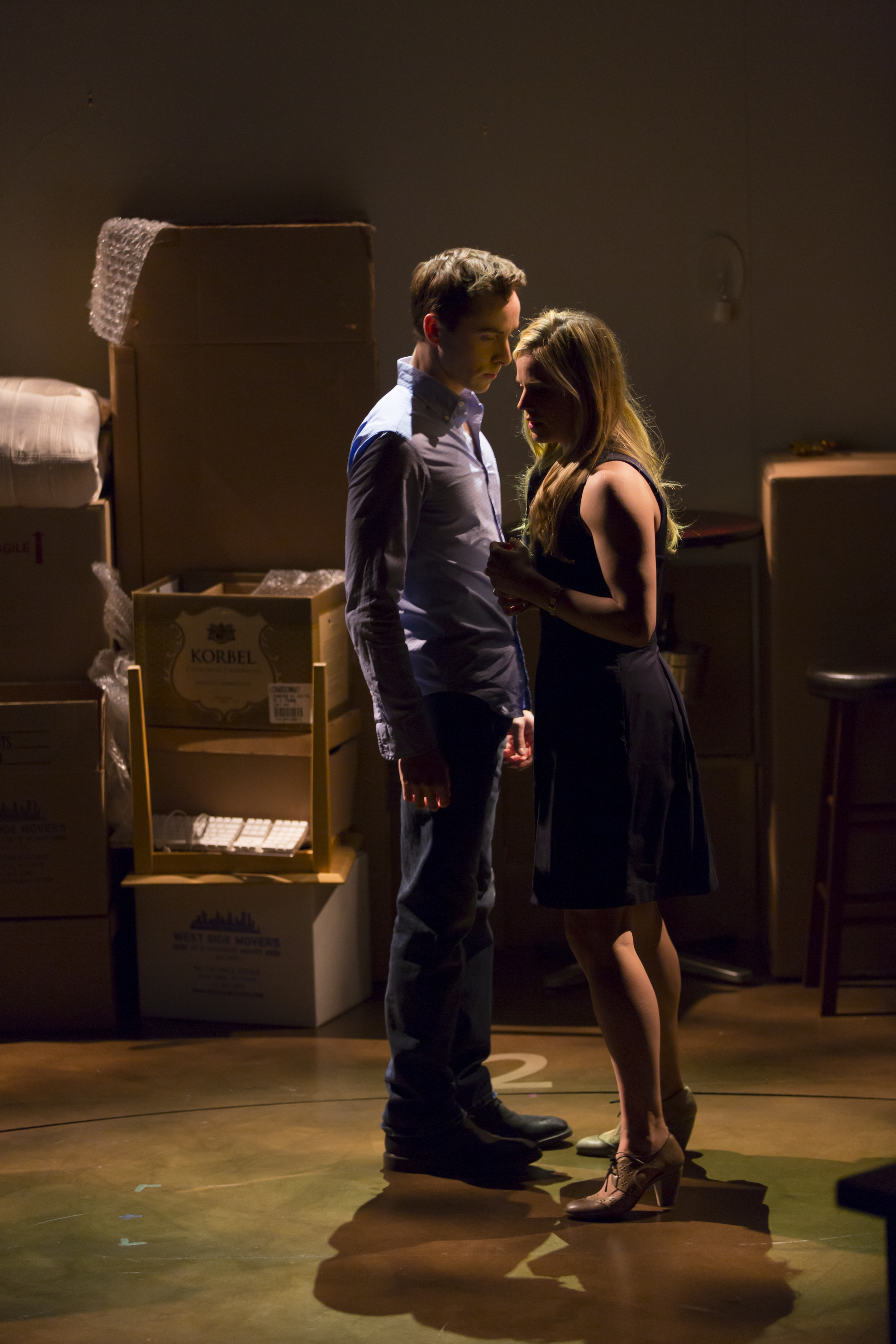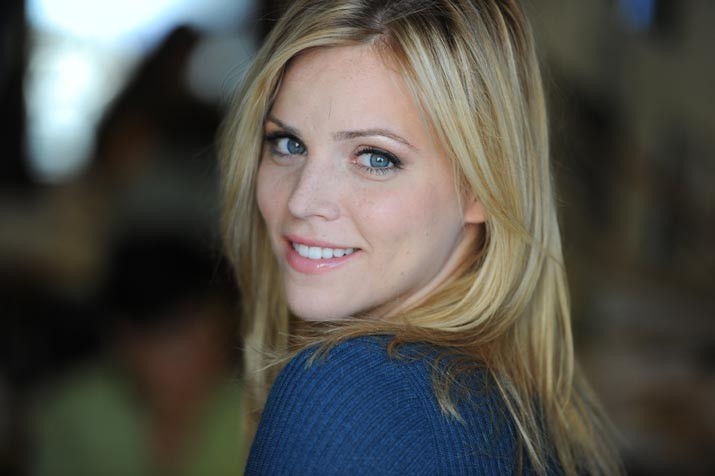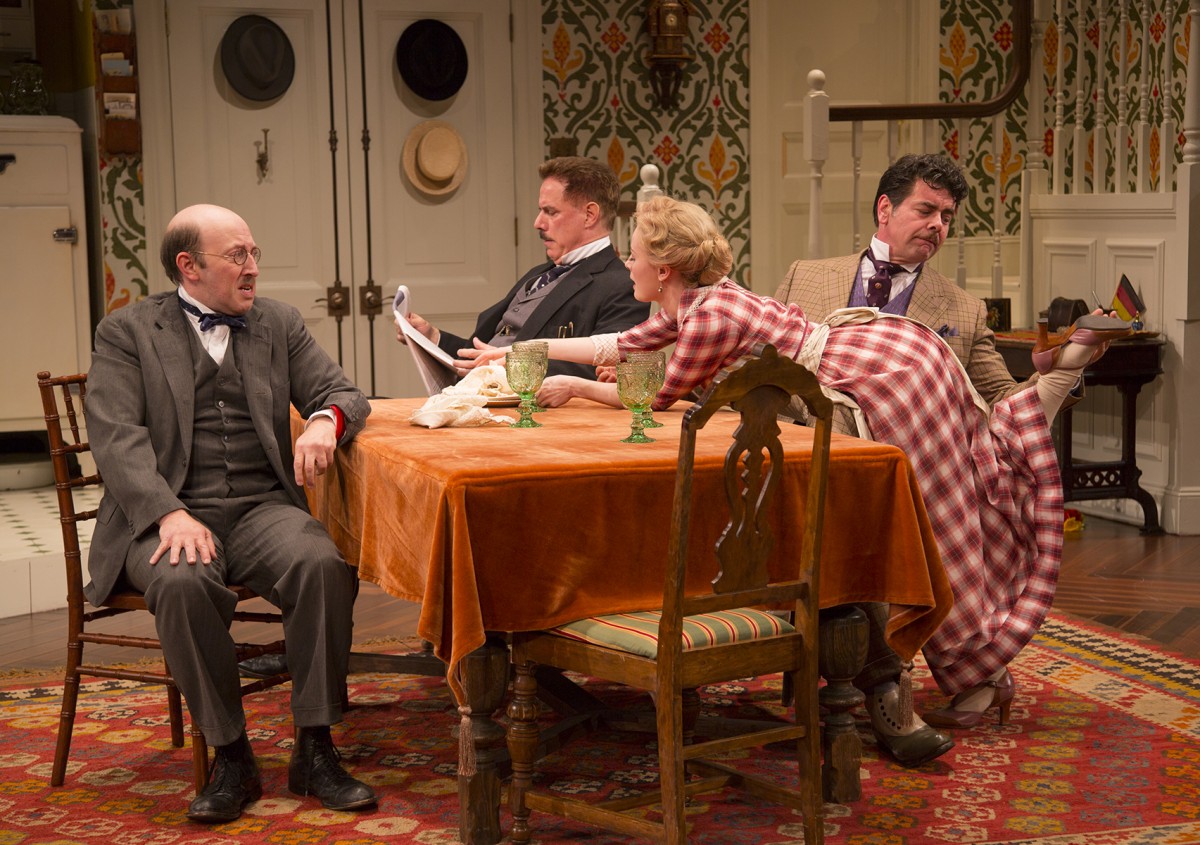Review of The Last Five Years at Long Wharf Theatre The odd thing about Jason Robert Brown’s The Last Five Years, now playing at the Long Wharf Theatre, directed by Gordon Edelstein with musical direction by James Sampliner, is that, though it’s set in the “beginning of the 21st century” (the show originally opened in the Chicago area in 2001) its main plot tropes seem to date from earlier in the 20th century—say, the Fifties or Sixties.
We meet a couple, Cathy (Katie Rose Clarke) and Jamie (Adam Halpin). For five years they are a couple: he’s rising to success as a novelist; she’s struggling to become an actress. The songs in the show are for the most part soliloquies in which either character muses on where they are—romantically and professionally—at the moment. And, lest that should prove too “he said, she said,” Brown cleverly reverses the order of Cathy’s story, so we see her at the end of the relationship first (“Still Hurting”) and move backwards with her to the end of the couple’s first date (“Goodbye Until Tomorrow”); meanwhile, Jamie takes us in chronological order from his early infatuation with Cathy (“Shiksa Goddess”) to his last goodbye (“I Could Never Rescue You”). If you consider for a moment the titles, just named, of Jamie’s songs, you might see what I mean.
The notion of the Jewish boy enthralled by the blonde goddess who is anything but Jewish comes to us, in literary culture at least, from the likes of Philip Roth—who might in fact be a good model for this rising novelist, learning how to be a womanizer, and whose career got started in the late Fifties. The very notion of the “male hero” novelist—while still alive in our current century—should have felt somewhat dated when the show opened at the turn of the last century. Add to that the notion that, somehow, the man is supposed to “rescue” (or thinks he is) the woman and you can see a sort of “frozen in time” ethic at work here. Granted, that very retro attitude may be one of the things that sinks this relationship—see also Cathy’s “I’m a Part of That” and “When You Come Home to Me”—since it seems predicated on relationship roles elders among us might recall having been exploded in the Seventies and placed, we imagined, under irony thereafter.
My sense of the time warp might not have struck me so strongly if not for the differences in the relative strengths of the performers. Clarke’s voice (“I’m a Part of That”) and sense of comic timing (she’s great in the audition scenes of “Climbing Uphill”) make her the stronger of the two before us, and she has the moral high ground from the first song, so, though it may be a Man’s World, it’s not a man’s play. Halpin puts a lot of hurrah into his performance—he’s best at the narrative comedy of “The Schmuel Song”—but he seems unconvincing as both great success and vacillating cad. Though on the latter score, he gives a sensitive touch to “Nobody Needs to Know” (in his first extramarital fling) and can be stern, when suggesting that Cathy's doubts about their marriage come flavored with sour grapes—“I will not lose because you can’t win.”
What works best in this show is the staging. Eugene Lee’s set decoration gives a sense of the temporary nature of these “five years”: things are boxed up and either yet to be unpacked or yet to be carted off by the movers, depending who is onstage. The large spinning play area in the center of the stage, with numbers at clock positions that glow to remind us that timing is of the essence, provides some nice effects as well, particularly when the couple’s one duet, “The Next Ten Minutes,” happens in an improvised boat moving along a pond in Central Park.
The cast is to be commended for not only singing almost everything they say but also for remaining constantly onstage and for having to provide the props of scene changes. It’s a fascinating show to watch for its fluid use of space and objects—director Edelstein knows how to show-off the stage at Long Wharf—and for some nimble actions, like Halpin’s impressive leap to a table top early in the show. Likewise, the band—led by Sampliner—positioned high above the stage like celestial accompanists earn vigorous applause for the tour de force rendering of the diverse musical score that adds considerably to the evening.
As a tale of a couple—unwinding and rising simultaneously—The Last Five Years affords moments of reflection on how these things go. There’s Cathy’s charming excitement (“I Can Do Better Than That”) as she brings her man home to her parents—dissing on the locals she’s glad to get shut of; there’s Jamie’s realization that a wedding ring on a man is a temptation to a certain type of woman (“A Miracle Would Happen”), all of which makes our heroes rather shallow. There’s an emptiness in the life they seem to imagine they want and in the life they seem to get, and there’s not enough satire to make us laugh at them nor enough real feeling to make us identify with them. Those who like a good cry at the end of a love affair, may find that, with these two, it all seems no great loss. They’ll be fine.
Likeable enough, I suppose, The Last Five Years only lasts 80 minutes.
The Last Five Years Written and composed by Jason Robert Brown Directed by Gordon Edelstein Musical Direction by James Sampliner
Set Design: Eugene Lee; Costume Design: Paul Tazewell; Lighting Design: Ben Stanton; Sound Design: Leon Rothenberg; Production Stage Manager: Jason A. Quinn; Assistant Stage Manager: Amy Patricia Stern; Casting: Calleri Casting
The Long Wharf Theatre May 7-June 1, 2014







